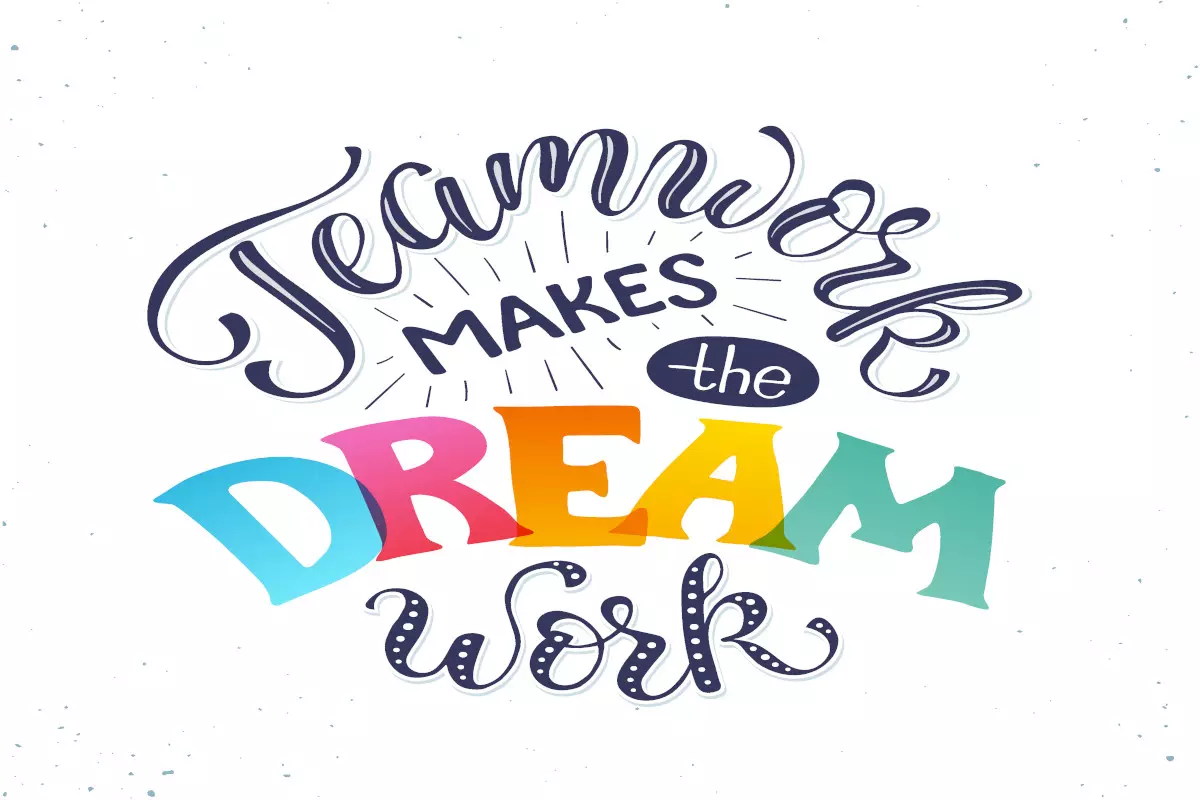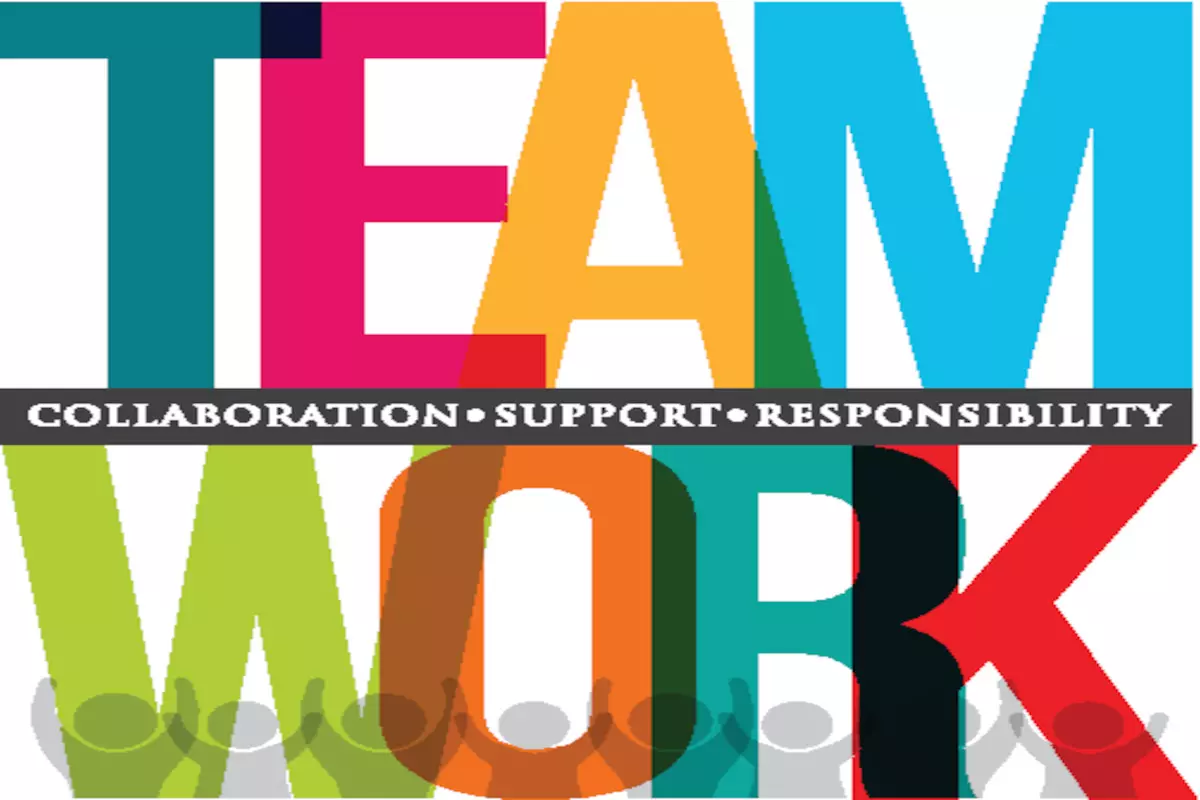Teamwork Makes the Dream Work: What Does That Mean?
“It takes a village to raise a child.” “There’s no ‘I’ in a team.” “Teamwork makes the dream work.” – what do all of these sayings have in common? They celebrate the virtue of teamwork and collaboration.
If you’ve taken part in a group project, been on a sports team, or completed a team-building exercise with your coworkers, you’ve probably heard this “teamwork makes the dream work” quote at some point in your life.
Sure, it may have seemed corny or inspired some eye rolls at the time, but so often, when we hear wise words in the form of digestible quotes, we forget to stop and think about their deeper meaning.
Who Said That Teamwork Makes the Dream Work?
There are a lot of people who said teamwork makes the dream work, but the phrase is accredited to John C. Maxwell, an American clergyman turned author and speaker. “Teamwork makes the dream work” is one of the most overused sayings, but that’s only because it holds so much truth.
Maxwell writes extensively about teamwork — over 70 books’ worth, in fact! With 20 million books sold, some of which have been translated into over 50 languages, it’s clear that Maxwell knows a thing or two about the value of teamwork: in business and in life. There are many other John Maxwell quotes on teamwork but the best known is for sure “teamwork makes the dream work.”
There’s a lot we can learn from Maxwell’s warm approach, starting with understanding the meaning of his most famous line. Once we understand the true meaning behind the phrase, we can apply these insights on the philosophy of teamwork to our careers, relationships, emotional intelligence, and beyond.
Where Does Teamwork Makes the Dream Work Come From?
Maxwell wrote many books, but his most quotable title remains “Teamwork Makes the Dream Work,” published in 2002. This, of course, is where the infamous line comes from. The quote doesn’t end there, though. In his book, Maxwell actually takes it a step further. The full quote is, “Teamwork makes the dream work, but the vision becomes a nightmare when the leader has a big dream and a bad team.”
The second half of this saying is often left out, but it’s just as important (if slightly less catchy) as the first part. It might not be as optimistic and cheerful, but that’s precisely why we need to pay attention to it.

First, though, let’s break down the famous part of that line. “teamwork makes the dream work,” meaning that collaboration and working together towards a common goal is the only way to achieve that goal. It doesn’t just need to be your dream; it needs to be everybody. Otherwise, a dream is just that — a dream, and it will not come to fulfillment (and even if it does, it won’t come together nearly as smoothly).
Teamwork may not be applicable in every situation, of course; sometimes, there are things that only we as an individual can work to change. But in the external world, whether it be personal relationships or a business endeavor, you can’t always go it alone.
Now let’s analyze the more ominous part of this quote: “…but the vision becomes a nightmare when the leader has a big dream and a bad team.” This is to say that everyone involved in a project needs to be on the same page. They need to be all in: mentally, physically, and emotionally.
This brings to mind another popular saying: “A chain is only as strong as its weakest link.” Each link on a chain is useless alone. But when linked together, they form a singular unit capable of accomplishing mighty feats. If you have a chain link that is disconnected from the rest, that chain will fall apart, no matter how strong the rest of the chain is. Just like your team, the entire chain becomes useless without a common vision.

The keyword at the second end of the “teamwork is the dream work” quote is the word “leader.” Notice how Maxwell differentiates a leader from the rest of the team. Just because “teamwork makes the dream work” doesn’t mean that everyone is on completely equal footing.
For teamwork to make the dream work quote come true, there needs to be an authority figure guiding the way. Of course, a good leader should also function as a team member and be held to the same standards, but the important part here is that a team leader is both on the team and not.
Maxwell draws attention to this to emphasize that every great team needs leadership, someone who will hold each team member accountable to their goals, and that ambition alone cannot save you.
The leadership and each team member need to put in the work to succeed in their endeavors. The best team leader on the planet will not succeed if they don’t have an equally effective team behind them to carry out their vision.
Leaders need a great team of people who can take guidance and bring their own intuition and skills to the table. And, of course, each of these people must work together effectively. Good team members should be strong on their own and even stronger together. That’s why it’s so important that your colleagues know how to be productive team players.
The Philosophy of Teamwork
Teamwork is defined as “the combined action of a group of people.” So what constitutes “good” teamwork, and what is the reasoning behind it?

In a winning team, every individual in a group shares the same goals. That doesn’t mean that everyone needs to think like one another — in fact, it’s usually better if they don’t. All that’s important is that team members can put aside their differences for the sake of the common good. Collaboration, communication, and willingness to cooperate with one another are essential.
For a team to function, it needs to be well-rounded and balanced. That’s true whether you’re working with seasoned professionals or studying how to start a business.
As mentioned before, not everyone in a group needs to have the same skills, interests, or abilities. An essential tenant in the philosophy of teamwork is that teams are strategically formed based on individuals’ strong suits. That way, if one link in the chain starts to falter, another link can pick up some slack.
Therefore, when organizing your team, you need to think about what possible weak spots may exist and take measures to counteract this. For example, say you have a team member who can produce a massive volume way ahead of schedule. Occasionally, though, they slip up, and one out of every 30 items is defective. This person is undoubtedly still a valuable member of the team, and you don’t want to transfer them to another team.
A better way to handle this situation is to bring on another team member who has strong attention to detail to check for defects. By reinforcing your fast producer with thorough quality control, you’re building a strategic team.
Maxwell says that this principle is essential to building a solid team because you can accomplish greater goals. You can achieve higher because everyone can contribute their individual strengths. The sum of this effort will be much greater than the separate parts. When working on a strategic team, strengths and weaknesses are balanced so that it’s not up to one individual to do everything. This tenant is at the core of good teamwork.
Good communication is also essential for accomplishing tasks that are spread across multiple channels. An effective team should know what stage of production they’re in at all times. There should be no guesswork about what the next steps are and who should take them. A strong team works together, with the grain, rather than against it. This also means that coworkers should be able to handle constructive criticism with humility.
Finally, support is necessary for teamwork to make the dream work. Your team members should have each other’s backs, physically, mentally, emotionally, or however, the case may be. This circles back to collaboration.
Team members who support each other, share knowledge, and actively work to make each other’s jobs easier are going to achieve much greater success than team members who bicker or attempt to sabotage each other or slow each other down.
Does Teamwork Really Make the Dream Work?
If you’ve ever been on a fantastic team — one that worked in unison towards the same goal, communicated, was supportive to one another, and knew when to pick up the slack — then you know the answer to this question “Does teamwork make the dream work?” is a resounding yes.
A team that does not have these attributes, on the other hand, often does more harm than good. Therefore, teamwork is almost always positively regarded, as long as it is good teamwork.

Of course, there are also times when a team is not necessarily called for and can actually slow down and hinder rather than improve the result.
Sometimes working alone has its advantages. For example, sometimes it’s easier to complete a task yourself rather than to rely on someone else to complete it. You may have to coach another person to do the job, which can be time-consuming.
The downsides to taking the do-it-yourself approach may be workload and not being able to pass on knowledge, but the upside is timeliness. If you’re working alone on a project you already understand and are familiar with, you don’t need to wait for the rest of the team to get up to speed. Some people also find it easier to concentrate on a task when working alone.
When working across multiple teams and channels, many people find communication difficult. When just one person is working on a task, they know exactly what stage of production it’s in, and they have all the information. If a manager comes to them for updates, they can relay all of this information in full detail, and the manager doesn’t have to hop from desk to desk asking the same question to multiple people.
A Time When Teamwork Made the Difference
Teamwork is somewhat of an abstract concept, one that leaders are always trying to figure out. Good, effective teamwork can seem elusive, but by looking at concrete examples of times when teamwork made the dream work, we can better understand why it’s so important, how we can build high-achieving teams and how to increase productivity.

Take a classic example shown by the success of the Ford Motor Company. This is one instance where teamwork in the workplace made it all come together.
Henry Ford, the founder of Ford Motor Company, had a vision: to manufacture the first widespread American automobile for consumer use. Ford was a revolutionary businessman not just because of his product but also because of his business model, which utilized the philosophy of teamwork.

Ford’s successes in the American automobile market can be attributed to his investment in a vertical integration business strategy, which allowed him to install the first moving assembly line for mass production of automobiles.
Ford automobiles were assembled in his factory from start to finish. The Model N car, a predecessor to the famous Model T, was built by first arranging the parts on the floor, then sending the car down the line as each step of the assembly was completed.
We can see how this approach took teamwork quite literally; each assembly team member had one job, which could only be accomplished once the person before them completed their job. Each worker was an essential asset to the team, and only by working together could the product be realized. Ford understood the value of having loyal compatriots on his team, too; he paid his workers higher wages than his competitors and provided good benefits. This promoted productivity and ensured that employees were well-taken care of. As a result, many of his original employees stayed with the company for decades. This is the true definition of teamwork in business.
In conclusion, it is evident that teamwork does make the dream work. John C. Maxwell knows this just as well as Henry Ford did. It’s a highly used phrase, but one that has stood the test of time – the philosophy of teamwork, individual commitment, and team performance